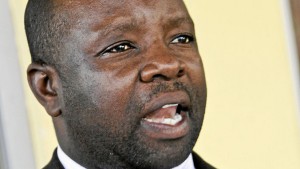And even more intriguingly, while Kereke – a former advisor to the central bank governor – claimed the gun was surrendered to the RBZ, the apex bank’s security chief said the firearm was never returned.
RBZ Head of security, Gracium Muradzikwa, told court that his superior, one Mirirai Chiremba, approached him sometime in 2010 asking if he could take the gun and back-date it in his records.
Chiremba is expected in court on February 29 to give his side of the story.
Kereke is denying the charges arguing that, at the time of the alleged rape, in August 2010, he had already surrendered the gun to RBZ authorities in charge of security.
However, Muradzikwa told court that he refused to take the gun which Chiremba wanted to smuggle back into the bank’s security division.
Leading his witness, private prosecutor Warara asked Muradzikwa whether he ever received the gun back from Kereke.
“The weapon hasn’t been returned to me as we speak right now,†said the witness.
“It is still outstanding in our books; but what I remember is I was once called by Mr Chiremba who is the boss of our division sometime in 2010. He wanted to give back the weapon and he asked if I could receive it and also back date it.
“I told him I couldn’t because our books are audited. I also told him I would require an explanation to give the administrator. I told him I would not receive (the gun) and I stormed out of his office.â€
Muradzikwa told court that his boss told him that “Dr Kereke wanted to return the gun for other reasons.â€
“I didn’t ask him what the reasons were but he also went on to tell me that Kereke had told him security threats he used to face were no longer existent,†Muradzikwa said.
In his defence Kereke, insisted he returned the gun on June 14, 2010, months before the alleged rape took place.
He also said he has up to date documentary evidence proving that he returned the weapon.
Court heard that the RBZ has a book which officials who receive weapons sign upon receiving and surrendering them.
However, Kereke tendered before the court a memo in which Chiremba confirmed having received the gun from the then Governor’s advisor.
Responding, Muradzikwa told court that, as one directly overseeing security issues at bank, he never came across the documentation.
“I don’t know to whom it was returned. I don’t have the records up to now and I don’t have the weapon,†he said.
Kereke’s attorney Erum Mutandiro, as usual being directed, by his client objected to the evidence of the RBZ firearms book saying it was unbelievable that the central bank could use a counter book to document its weapons.
“It puts the accused person in a very difficult position and infringes on his right to a fair trial.
“For a central bank to have such a book as a firearms register is unfounded and the private prosecutor is tramping on my client’s rights,†he argued.
But the private prosecutor Warara hit back at the defence attorney.
“Your worship my colleague should not forget that his client in this court for tramping upon someone’s rights,†said Warara.
“He clearly doesn’t know the direction which we are going and is trying to tell this court lies by saying we never gave them the firearms register.
“I think he must be reminded that he was not the first lawyer to represent the accused. We gave all papers to the initial attorneys and it must be automatic that everything was handed over to him.â€
Kereke is accused of raping a close juvenile relative who was, at the time, 11 years old at his Vainona home on August 22, 2010.
He is also facing charges of grabbing the buttocks and breasts of the victim’s sister while his wife had gone shopping during the same year.
However, the legislator’s defence is that the accusations were a ploy by his enemies to tarnish his political and business images.
The trial is the first high profile private prosecution case in years.
It comes after the then Attorney General, Johannes Tomana, had for five years declined to prosecute the case, arguing evidence was insufficient.
Post published in: Featured


